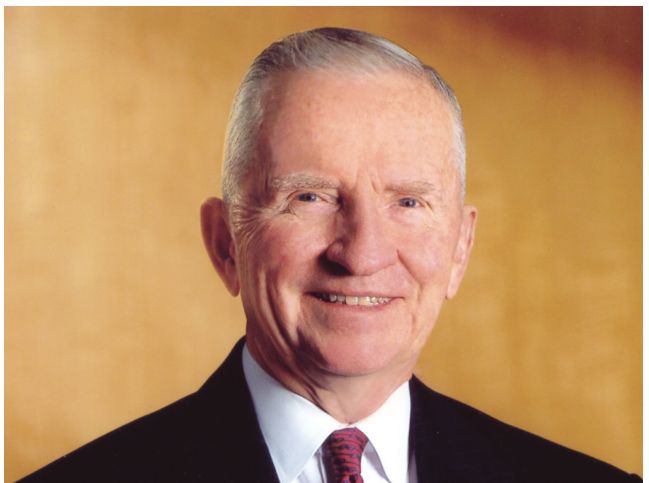
Donald Trump’s run for the White House in 1992
Donald Trump has run for the presidency before. He ran in 1968 disguised as George Wallace and again in 1996 as Patrick Buchanan. He also ran in 1992, as my excerpted column from Oct. 29 of that year recalls. Perot’s defeat – by a Clinton – did not still the authoritarian impulse among our countrymen, it only discouraged it for a while.
A political fable for our time: A nation’s political machinery is being run either by actors or by ambitious scoundrels. What its wise men decry as “muddle and legislative deadlock” has shaken the people’s faith that democracy can bring the country around.
Then a self-made man, a professional nonpolitician, appears on the national stage to offer an alternative. “Our program is simple,” he asserted. “We wish to govern . . . . They ask us for programs but there are already too many. It is not programs that are wanting . . . but men and will power.”
You betcha. This is not Ross Perot speaking in the 1990s, but Benito Mussolini in 1932.
Most Americans still are unsure what a fascist looks like, but now they know what one sounds like. The New Republic listed nine attributes of fascism that could have been a campaign-at-a-glance portrait of our boy Ross, if our campaign portraits considered ideas instead of personality.
Apart from his height – most fascist leaders were short – Perot makes an implausible national messiah. His feistiness compares favorably only to Bush, who has been made stupid and weak by privilege. His exhortations are hardly as rousing as Mussolini’s; Il Duce wanted to revive the glories of Rome, while all Ross wants us to do is pay off our Visa bill. . . .
Perot has no political ideas, as far as anyone can tell, but then fascism is an attitude as much as an ideology. As it evolved in Europe, fascism was less a program of government than a technique of getting and retaining power. It extols action over thought and obedience over skepticism, and harks back to Sparta with its calls to duty and discipline and an essentially tribal sense of nationhood. . . .
The big difference between the U.S. in the 1980s and ’90s and those nations is that fascism of a certain sort is a democratic choice.
Our leaders are compelled to provide fascist entertainments (under other names) as a condition of voter approval. However hard it is to understand, Americans’ sense of national pride was restored by farcical sideshows such as Grenada, Panama and Iraq that makes Mussolini’s invasion of Ethiopia look brave by comparison. And the chauvinist extravaganzas of the 1984 and 1992 Summer Olympic Games proved not that we are the superior race, as Hitler tried to prove about the Aryans in ’36, but that we have the superior soft drinks.
Our body politic also carries a number of antibodies that protect it against Europeanstyle contagion. TV destroys demagogues as quickly as it creates them, since it picks up ratings points either way. And most Americans are frightened as well as titillated by its Pat Buchanans. The problem of making politics a matter of “us” v. “them,” of course, is what to do with them when you win. In Europe they jailed them, or murdered them. Americans will happily acquiesce in murder but they hate being thought not nice.
Still, it would be a mistake to assume, as so many intelligent Europeans did, that because fascist causes are so often advanced by buffoons that they are harmless. Pat Buchanan’s call to cultural war, Bush’s sinister hints about Bill Clinton’s student trip to Moscow, everybody’s complaints about the “media elite (translation: Jews in Hollywood and New York), the wildly exaggerated fears of the black underclass, homophobia (the ultimate corruption in the virile state), and (less at the policy level than at the perceptual level) the specter of foreign invasion by Japanese money or Mexican labor – all are proto-fascist in tone and aspiration. And the antics of the Republican bully boys who intimidated workers from opposing campaigns in Houston was no less ugly because they wore white shirts instead of black ones. . . .
Whatever happens on Election Day, Perot showed the next guy just how easy it would be to mobilize a national political movement via talk shows. In spite of squandering his early momentum, Perot might yet achieve his coup. There’s nothing in the Constitution that prohibits the people from overthrowing themselves. Even if he doesn’t, no sensible person will be able to say that fascism is impossible in the U.S., only that it was not possible right now.
Contact James Krohe Jr. at [email protected].
Editor’s note
If you haven’t voted yet, it’s time to get to the poll and make your voice heard. There are great candidates on the ballot in every category. The super-enthused electorate, happy not angry, has already turned out in record numbers, knowing that even if their favorite candidate doesn’t win, this will still be the best place, with the best food, people, music and businesses. The Best of Springfi eld ballot is open for voting until 11:59 p.m. Sunday, Oct. 2, at illinoistimes.com. Winners will be announced in our special issue Oct. 27. –Fletcher Farrar, editor and publisher